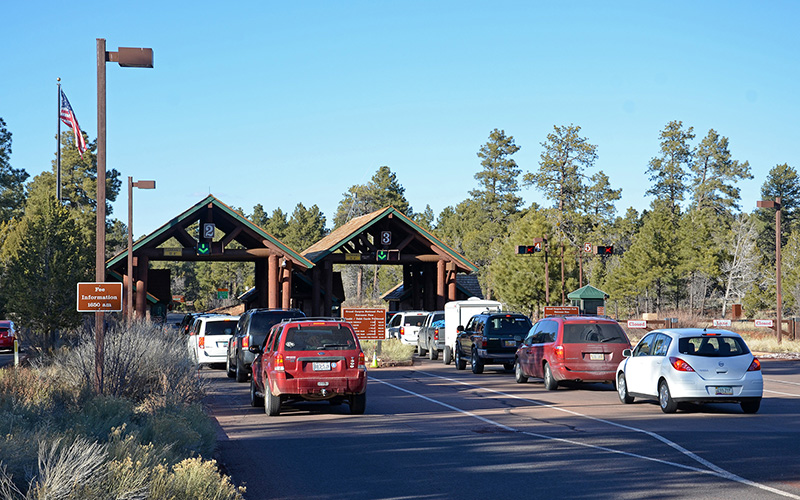
Cars line up to enter at the south entrance to the Grand Canyon in this 2018 file photo. Services at the park have been cut in response to COVID-19, but the park remains open and the Interior Department this week waived entrance fees to all national parks. (Photo courtesy Grand Canyon National Park)
WASHINGTON – Grand Canyon National Park is still open, but the same cannot be said for lodging and food services in the park that will be shuttered for the next two months by concerns over the novel coronavirus.
Grand Canyon Lodging on Thursday announced the “difficult decision” to suspend operations beginning at noon Friday and continuing through at least May 21.
The company, citing recent decisions in some jurisdictions to close bars and restaurants to help stem the spread of COVID-19, a respiratory disease caused by the coronavirus, said the decision was made out of concern for the health and safety of its employees and customers.
“This decision was not easy, and we recognize the significant impact on your travel plans. But we know that this is the responsible path forward to help slow the spread of the disease,” said a company statement, adding that Grand Canyon Lodging was “deeply sorry” for the disruption.
The announcement is just one of several affecting services at the park, which remains open. Delaware North announced this week that services at Yavapai Lodge and at Trailer Village would close Sunday, while park officials have halted shuttle service and closed the South Rim store and visitor stations, among other changes.
The Grand Canyon Lodging announcement comes one day after Interior Secretary David Bernhardt said entry fees at all open national parks would be waived until further notice.
“This small step makes it a little easier for the American public to enjoy the outdoors in our incredible national parks,” Bernhardt said in a statement Wednesday.
He said the change would also improve “social distancing,” a key strategy to prevent the spread of the virus, by reducing interactions between park workers and visitors. Bernhardt encouraged visitors to follow Centers for Disease Control and Prevention guidelines by washing hands frequently, keeping a safe distance from others, covering coughs and sneezes and avoiding touching your nose, eyes or mouth.
Requests Thursday for comment from National Park Service officials in Washington and Arizona were not immediately returned.
But some advocates said that while waiving fees is a good step, it should not be done just to make parks more accessible if that will lead to greater interaction between people.
“We remain concerned about the health and safety of park staff and visitors and strongly urge everyone to follow the guidance of public health experts before planning a trip to any park, in order to protect themselves and their communities,” Theresa Pierno, the president of the National Parks Conservation Association, said in a statement Wednesday.
Jeff Ruch, Pacific director of PEER, Public Employees for Environmental Responsibility, charged that the Trump administration “seems to want to convey a sense of normalcy, even when it is not justified” with the decision to keep parks open.
“We don’t think the decisions are being made by park professionals. We think they are being made by senior political officials,” Ruch said.
As park services are trimmed back, businesses and residents in the area said they are starting to feel the pinch from COVID-19.
Although some restaurants are reporting brisk business, understaffing and a lack of resources are the biggest hindrance to area businesses, said Laura Chastain, general manager of the Grand Canyon Chamber of Commerce. She said work attendance has already dropped by 50%, as employees choose to take leave, and that some businesses in the area are encountering “supply issues.”
The town’s local foodbank, which was restocked Wednesday, ran out of food almost immediately, she said.
“Yesterday, it ran out of food within an hour,” she said. Even with emergency funding that will be coming from local and federal governments, the food bank might struggle to get supplies because “it is coming up from Phoenix and there are no volunteers down there to load the trucks.”
